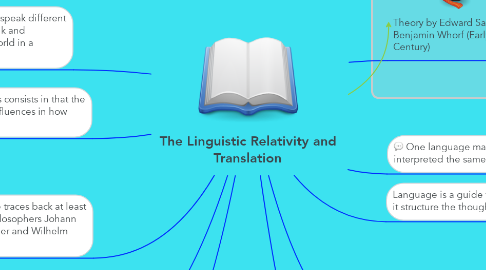The Linguistic Relativity and Translation
by savy Cordova


1. People who speak different languages, think and perceive the world in a different way.
2. This hypothesis consists in that the language used influences in how people think.
3. The principle traces back at least as far as the philosophers Johann Gottfriend Herder and Wilhelm von Humboldt.
3.1. Herder was at the forefront of a Romantic nationalism that celebrated the uniqueness of the German “spirit”and valorized the German culture in which ir was manifest. Crucially here, he attributed to language a pivotal role in the creation of this spirit.
3.1.1. These ideas found their most influential articulation through the work of anthropologist Edward Sapir and his student Benjamin Lee Whorf.
4. Also known as the linguistic relativity hypothesis.
5. Sapir and Whorf differed in their discussion of the relationship between language and culture.
6. Theory by Edward Sapir and Benjamin Whorf (Early 20th Century)
6.1. Benjamin Whorf
6.1.1. His idea came from when he found that the word "empty" had been misunderstood so he effected the behaviour.
6.1.1.1. “We dissect nature along lines laid out by our native languages." The world is presented as a kaleidoscopic flux of impressions which has to be organized.
6.2. Edward Sapir
6.2.1. Founder of the ethnolinguistics and his idea was that what we see, think, hear and experienced is related in with what we do.
